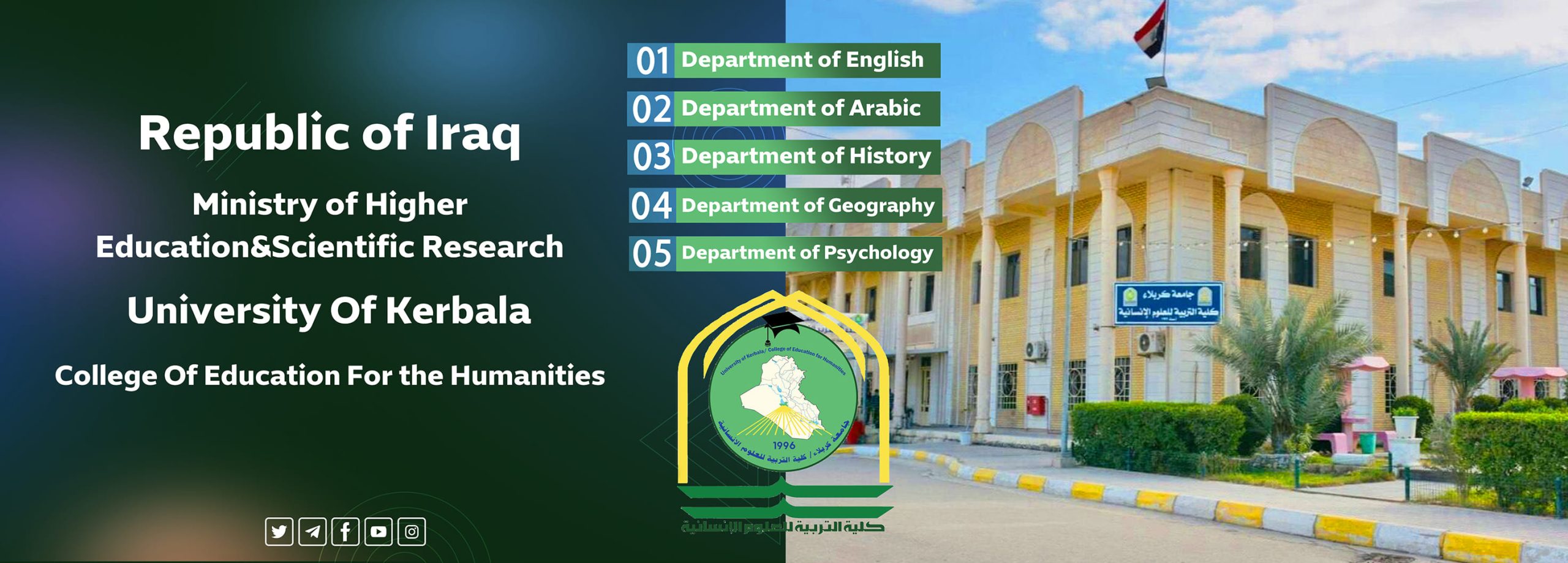Introduction:
The Arabic Language Department is one of the core departments in the College of Education for Humanities at the University of Karbala. It was established at the same time with the establishment of the college in 1996 when it was affiliated with the University of Babylon. Over the years, the department has developed and expanded, currently accommodating more than 800 students in the morning and evening undergraduate programs, besides around forty students in the postgraduate programs (MA. and PhD. degrees). The department consists of forty-five faculty members, including twenty professors and fourteen assistant professors. Currently, Professor Dr. Ali Kadhim Mohammed Ali leads the department.
The department’s primary focus is on preparing competent individuals and contributing to the development of the educational process, as well as participating in the enhancement of educational thinking and collaborates with the Iraqi Ministry of Education in studying educational issues within the specialized problems in various departments of the college.
Vision:
The Arabic Language Department (as a part of the educational institution) strives to occupy an esteemed academic position within the educational institution, surpassing local and international educational and academic institutions of a similar nature. It aspires to outperform these institutions and distinguish itself, becoming a pioneer in providing the best services for the Arabic language. The department aims to be a scholarly beacon that is widely recognized locally, regionally, and internationally, with the guidance and blessings of Allah.
Objectives:
The department aims to achieve a set of objectives, including:
Preparing competent professionals in accordance with modern educational trends to work in secondary education and teacher training institutes. This is achieved by providing them with scientific knowledge and equipping them with the attitudes and skills necessary to effectively carry out their duties professionally. They are prepared to be mentors, coordinators, motivators, and encouragers for their students, capable of understanding students’ needs and developmental characteristics. Additionally, they are prepared to face the demands of life in a rapidly evolving and changing era.
Contributing to the development of the educational process at all levels and by enhancing its effectiveness through organizing specialized seminars and conferences that address the problems and obstacles faced by the educational process. Furthermore, Researches and studies are conducted to diagnose weaknesses in the educational system and provide recommendations and proposals for addressing and reducing them.
Participating in the development of educational thinking and practices, as well as disseminating modern educational trends and their applications, and providing educational advice in specialized fields within the scope of the college departments. This serves the community and provides solutions to its problems.
Collaborating with the Ministry of Education in studying educational problems and contributing to the development of education in terms of goals, curricula, study plans, teaching methods, evaluation systems, and examination processes. In addition to that, the department also contributes to the preparation and improvement of school textbooks.
Providing training for education professionals, including managers, supervisors, and educational counselors, to enhance their level and increase their professional expertise. They are kept up to date with the latest developments in various educational fields.
Mission:
The Arabic Language Department in the College of Education for Humanities aims to give the Arabic language an active presence in society, highlighting its profound spiritual heritage as the language of the Holy Quran and the language of the Prophet Muhammad (peace be upon him).
It also aims to emphasize its rich linguistic, literary, and aesthetic heritage, deeply rooted in the past, preserving the accomplishments, glories, and various sciences of the Arab people and present us with a vivid picture of their lives and ethics, while preserving the essence, authenticity, elegance, and beauty of the Arabic language.
Therefore, the Arabic Language Department undertakes the responsibility of serving the Arabic language and its literature, and present it to its learners with a genuine and scientifically grounded education based on modern and advanced teaching methodologies.
Studying in the Department:
The Arabic Language Department covers various fields of Arabic language and literature. It begins with the study of Arabic linguistics, including Arabic grammar, morphology, linguistics, and its jurisprudence. It also covers the field of Arabic rhetoric and progresses to the study of Arabic literature in its various stages. This includes pre-Islamic literature known as Jahiliyyah (dark ages) literature, Islamic literature, Umayyad literature, Abbasid literature across its different eras. Additionally, the department covers the study of Andalusian literature. It also includes the study of classical Arabic literary criticism, its major trends, and manifestations. Moreover, the department explores modern literature, its criticism, theories, trends, and stages of development.
Furthermore, the Arabic Language Department puts a great emphasis on the study of the sacred Quranic text. It involves analysing the texts, studying them, and elucidating their artistic and aesthetic features, as well as their stylistic structures. And take it as a reference for linguistic, rhetorical, literary, and aesthetic applications within the department. Additionally, the study in the department includes an important aspect of psychological and educational sciences throughout all stages of study, as it prepares individuals to engage in the educational process within society.
Higher Studies
The Arabic Language Department not only focuses on undergraduate studies but also offers postgraduate programs, including MA. and Ph.D. degrees, in various disciplines of Arabic language and literature. It is staffed with a distinguished faculty comprising highly qualified professors with advanced academic degrees in linguistic, literary, critical, and rhetorical specializations. Since the establishment of postgraduate studies in the department in 2007, it has produced a significant number of graduates in various fields such as language, grammar, literature, rhetoric, and criticism. These graduates have contributed to the academic staff in Iraqi universities, leading the educational process and sharing the knowledge they acquired during their studies in the department.


























































